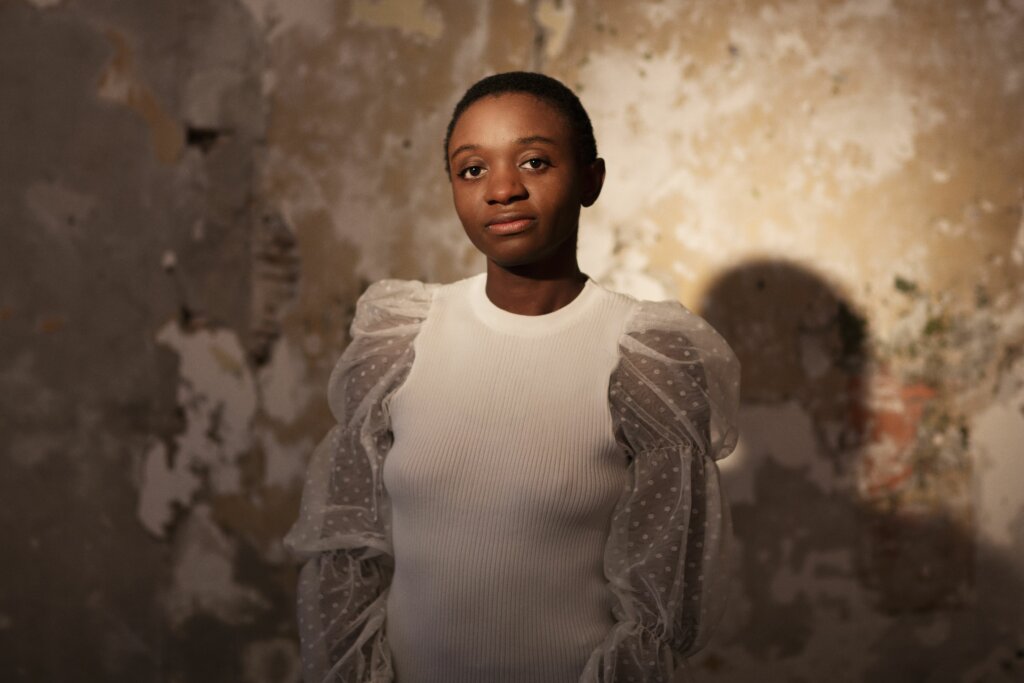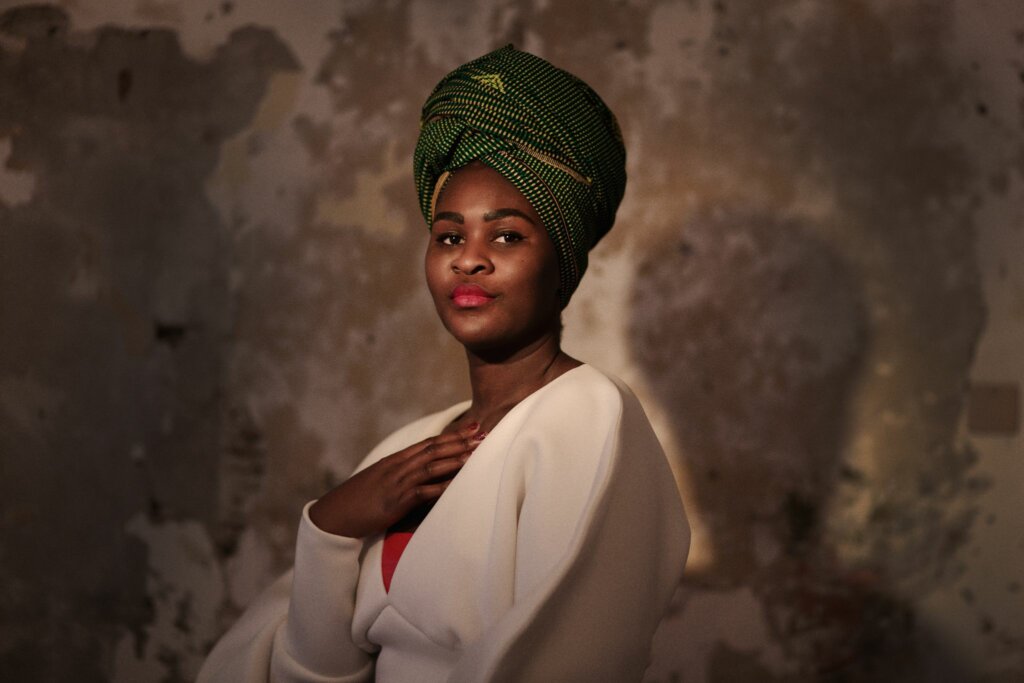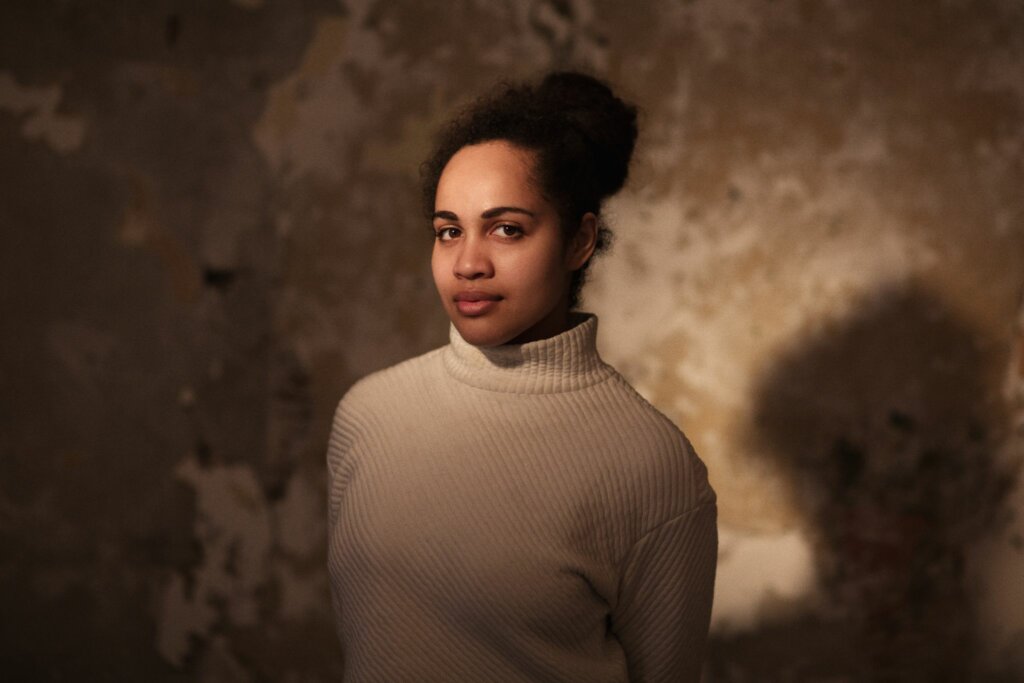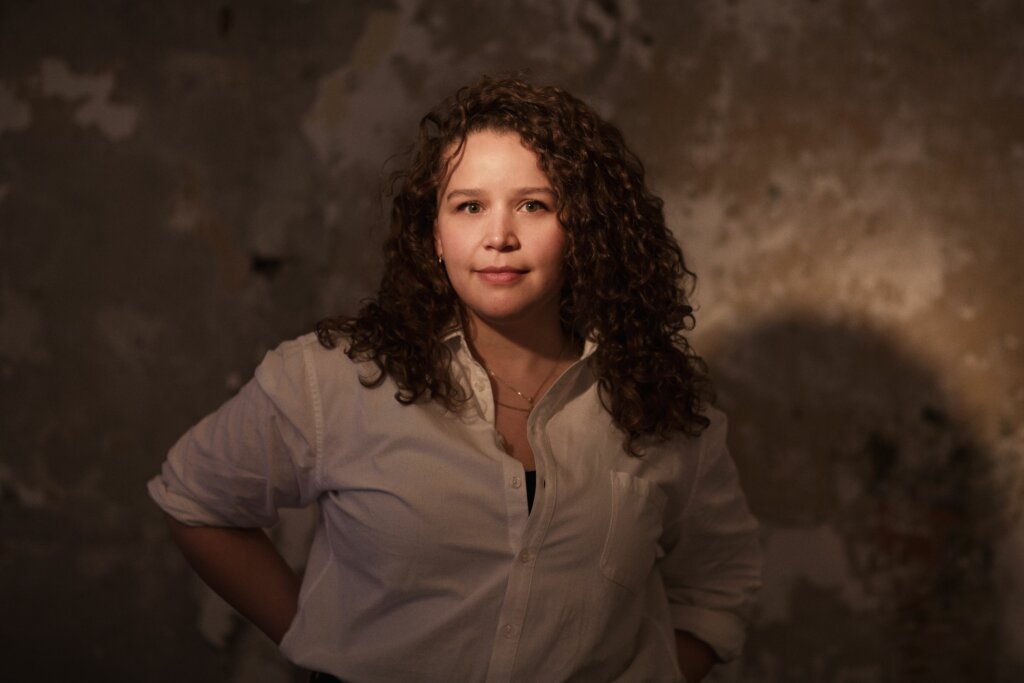Afro to the Future by Marie-Lydie Nokouda, Teater Grob
Af Anika Marschall
“I want you to look at me. Look at me. Look at me!” Black out. Goose bumps. Thunderous applause and standing ovations.

Afro to the Future presented eight new writings by Black playwrights at Teater Grob, of which I witnessed four plays on the second evening of the event. With Afro to the Future, the artistic leader and actress Marie-Lydie Nokouda has created a powerful, love-filled and energetic space, bringing life back to the theatre – which was on this day, filled with a majority of Afro-Danes and Black and Indigenous People of Colour (BIPoC audiences).
The decentering of Whiteness, the focus on intersectional forms of oppression, the decolonisation of ‘the canon’ and the way stories are told on stage lies at the heart of reconfiguring what it really means to gather again at the theatre after so long. To be present, to be recognized, to be seen and heard on one’s own terms is at the core of the readings at Afro to the Future. It is the first artistic event organised by Nokouda’s new artist development platform Black to Normal:
Black to Normal’s første event Afro to the Future giver sceneplads til nye, stærke stemmer og præsenterer en række korte dramatiske tekster rodfæstet i afro-futurisme. Aktion, protest og billedkunst tager form på scenen! Black to Normal er den første kunstneriske platform i Danmark, der målrettet arbejder på at opdyrke og synliggøre de skjulte talenter inden for dramatik og scenekunst som findes blandt afrodanskere.
Without exhausting herself in seeking to revolutionise the slow machines of theatre institutions from within, Nokouda has instead built a new infrastructure for artist development and new writing by BIPoC. Black to Normal thus actively intervenes in theatre’s slow response in nourishing these voices and working together long-term, rather than in one-off projects, where all too often BIPoC artists face tokenism and being consumed by hegemonic White gazes.
The four plays
The reading of Choco Guilène’s play Bare Izabelle opened the evening. Guilène’s play is set on Christmas, dealing with a Danish family, a White mother and father (hilariously portrayed by an empty, silent chair on stage), and two sisters, one White and one Black. The play depicts a loud sisterly fight in realist style. The White sister pulls all the common tropes of racist micro-aggressions against her Black sister, who defends herself with humour, anger and doing the labour of educating and explaining racism, which so many other Woman* of Colour do in their everyday life with family and friends, to the point of exhaustion and the loss of sense and even self-destruction. The sisters fight over judgements on outward appearances, and even commenting on biological essentialism, i.e. what is determined by their different DNA. The realist personal domestic scene becomes the site for political struggle. In a skilful dramaturgy of leaving the important things unpronounced, the actual root of the issues lies in the White ignorance and White innocence, also found within the nuclear family structure. The mother dances to Christmas songs (“I am dreaming of a White Christmas…”) in the background with the absent father, never once answering her Black daughter, when she is seeking support. The audience shouts in agreement, when the Black sister tells the other in the peak of the fight, that White people’s success is forged on the back of Black people’s labour, that she does not even begin to understand what is at stake. She calls out her White sister’s consumption of Black imagery as a structural issue – her love for the Kardashians in particular. Bare Izabelle negotiates the dominance of Whiteness and raises a loud and proud voice as to what it means as a Woman* of Colour to navigate the relentless, constant and essentialising projections made onto ones body in contemporary Denmark.

Mo Chara’s play Mit Navn er Mohammed tells of a young Muslim, losing his brother and recounting years of growing up together, losing oneself in the constant negotiation of belonging, home, brotherly love, abusive parents, faith, and Islamophobic hatred. The play is a collage, which switches from present-day realities of mourning to childhood memories, and back again. Chara plays the character himself and creates a melancholic, heart-breaking tapestry of the complexities of dealing with intergenerational trauma.

In Skamløs, playwright Rebecca Langley Jensen puts centre stage a confident, wilful, passionate female character, who has lust for life and suddenly finds herself pregnant. In witty, realist dialogues with her friends, she deals with the question of wanting to have the child, while also facing a White, all-too angry and frustrated gynaecologist, who indexes to me the subtle violence ever present in Black Women’s relation with gynaecology’s brutal roots in slavery.

Sandra Mahmoud Lindquist’s play Oprah Winfrey har alt, men ingen børn presents a one-way conversation between a mother and daughter, and blends this realist conversation with hyperreal scenes of Oprah Winfrey, before jumping to a meat-theatrical beat-box commentary at the end. While the mother is refusing to genuinely listen and is set on endless repeat saying “Jeg fik dig. Du fik mig. Jeg fik dig. Du fik mig. Jeg fik dig og du fik mig”, she disappoints her daughter, who is trying everything to have a genuinely honest conversation with her about whether or not she should have children, and what it means to be a Black mother and a mother to Black children in Denmark. In the play, Oprah Winfrey is one of the few Black people visible on television and becomes a figure of advice, wisdom and problematic and uneasy identification for the young Afro-Danish female protagonist (played by Hazel Watt). The conversation and the daughter’s reckoning with her future are infused by commonplace, ridiculous wisdoms by the famous Oprah, who is played by an absolutely gorgeous and jaunty Diêm Camille G. The audience bursts into laughter, when Oprah commands her White Alexa, a not-quite human figure, a servant (embodied by the equally brilliant Biljana Stojkoska). Stojkoska performs as the butt of the joke and runs around the stage to rearrange chairs just slightly, when Camille G. sassily snaps her fingers. Finally, the roles of mother/daughter/Oprah are hybridising into something else on a meta-theatrical level and we end the reading on a high note: Stojkoska beatboxes clumsily and in hilarious fashion, while Watt and G. join in with a rap, featuring satirical lines about what is in their DNA.

Staging (un)normalcy
The plays’ dramaturgies mostly champion realism, are set in contemporary Denmark and seek to establish BIPoC narratives, perspectives and stories in the Danish canon. In spatial contrast, the stage set is infused by Afrofuturist imagery and point to a completely different decolonial dramaturgy in the making gesturing to somewhere beyond what can be captured in a play text alone. The minimalist stage set is designed by the artists Hesselholdt & Mejlvang and the few chosen props index the umbilical cord between Danish colonialism and modernist aesthetics. On the right side, there is a white Piet Hein dinner table with seven white Arne Jacobsen chairs, two classical Danish design brands. On top the table, a Black panther sits ponderously enthroned, looking out into the audience with glistening eyes and baring teeth. On the other side of the stage, we see a pile of cane sugar, on top of which rests a luminous ball decorated with cowry shells. During the readings, the ball sheds purple light. Throughout the evening of Afro to the Future, a silent figure of another world and time occupies the stage space, too. Before audiences enter the auditorium, the performer Wanjiku-Victoria Seest is already present. Dressed in a White long dress and cowry shell necklace, and wearing a large White hat with a gigantic brim, she quietly places herself somewhere different on the stage floor with every reading. Sitting gracefully with cocked legs, she holds this posture, while vesting spiritual energy into the theatre space. At the closing of Afro to the Future, Nokouda thanks her team and waves the audience goodbye, while Seest burns incense and cleanses the space. In a relieving gesture, she opens the folding doors and then leaves the theatre space behind for a balmy summer night outside, re-entering the real world and taking us with her.
It is the uneasy notion of the normal, which carries through the evening and speaks to a wider reckoning within the theatre and performance art scene in Denmark (and beyond) and its (un)normalcy, and broad ignorance of dealing with colonialist legacies and prevalent racialisation. In their different readings at Afro to the Future, the playwrights make themselves heard and ask what it might mean to live through present-day realities in Denmark as a BIPoC, what kind of legacies they want to carry forth for future generations, and what their own roles are in bringing about radical changes in society. With a decided majority of women* with reproductive organs featured in the plays, the writers put strong emphasis on the question of whether or not to bring children into this world, how to decide on becoming a mother, and how to parent. The characters negotiate this in mourning, anger, exhaustion, but also with joy, hope and passion. They look for advice and support from friends, parents, idols you identify with and, last but not least, Alexa and crowd-sourced knowledge found on the world wide web. The stories hark on ‘normal’ settings and everyday encounters, which are interwoven with racism, Islamophobia, hyper-sexualisation and micro aggressions. The characters wrestle with what it means to navigate the world as a young BIPoC in Denmark, finding yourself and ways of belonging in the 21st century and how this century might play out in the long-term for future generations and descendants.
Moving over
With this text, I do not seek to obfuscate the history of Black and Afro-diasporic women* who have long organised in solidarity and fought against intersectional oppression, the painful prevalence of discrimination and hatred against BIPOC, including works across the arts and activist movements in Denmark and the Nordics. To name but a few respectively here: Jeanette Ehlers, La Vaughn Belle, Marronage, Working on our Power, Culture Art Society, The Union, Awa Kontaé, Yancé-Myah Antonio Harrison, Phyllis Akinyi, Deise Faria Nunes, Monia Sander, and Sandra Yi Secindiver’s recent play-reading event Død Over Troper at Mungo Park. I am engaging with these works and Afro to the Future from my position as a White, cis female, German-born ally theatre scholar migrant in Denmark, speaking Danish at a beginner’s level and writing from a geographical distance, but feeling deeply implicated in the ongoing work of institutional reform in the arts and education art large. I underline the importance of carefully intervening in epistemologies of ignorance and structural violence in knowledge-production (including the work of theatre criticism here at Peripeti and elsewhere), long committed against BIPoCs.
Afro-American writer Toni Morrison, in response to being asked over and over again why she would minoritise White people in her writings and if her writings were exclusively for ”her” people, elegantly responded to the questions by pointing to their racism and ignorance, saying she had never denied her intentions to address a Black readership. To the statement that by winning the Nobel prize (1993), she had now become part of the mainstream, Morrison replied: “I stood at the border, I stood at the edge and claimed it as central. And let the rest of the world move over where I was.” (https://www.youtube.com/watch?v=DQ0mMjII22I&t=6s – thank you to Azadeh Sharifi for that reference)
With Afro to the Future, Nokouda and her fabulous team set the scene for the theatre world across Denmark to come over to where they are – the work and artistry by BIPoCs are out there buzzing with ideas, passion, life and strength. Danish theatre institutions need a de-centering of White, hetero-patriarchal views, and Nokouda and the assembled writers and performers lead the way in using theatrical storytelling to make visible racial exclusions, the colonial structures prevalent in all parts of society and how they manifest in our bodies. What has long been on the way in the Danish art-world at large is now slowly entering the Danish theatre landscape, too. Move over, I am too.
Afro to the Future spillede på Teater Grob d. 10.06.2021 og 11.06.2021
Tekster af: Julie Deepawali, Hazel Watt, Saynab Farah Dahir, Diêm Camille G., Choco Guilène, Mo Chara, Rebecca Langley Jensen, Sandra Mahmoud Lindquist
Instruktører: Marie-Lydie Nokouda, Angelina Yoann Deidre Kirchoff, Runi Lewerissa, Alexander Mayah Larsen
Med: Gina Marchwinski, Tina Mweni, Sandra Mahmoud Lindquist, Thea Glindorf, Alvin Olid Bursøe, Marco Grimnitz, Choco Guilène, Cecillie Aclon, Søs Sif Thiele, Mo Chara, Rebecca Langley Jensen, Anna Hawa Kamuk Mnasi, Søs Sif Thiele, Hazel Watt, Biljana Stojkoska, Diêm Camille G., Wanjiku-Victoria Seest
Manuskriptkonsulenter: Aleksa Okanovic, Sosha Teperowska
Visuelt design: Hesselholdt & Mejlvang
Lysdesigner: Mathilde Hyttel
Kunstnerisk leder af Black to Normal og vært for eventet: Marie-Lydie Nokouda
Anika Marschall er Postdoc ved Aarhus Universitet, Institut for Kommunikation og Kultur, Dramaturgi.
